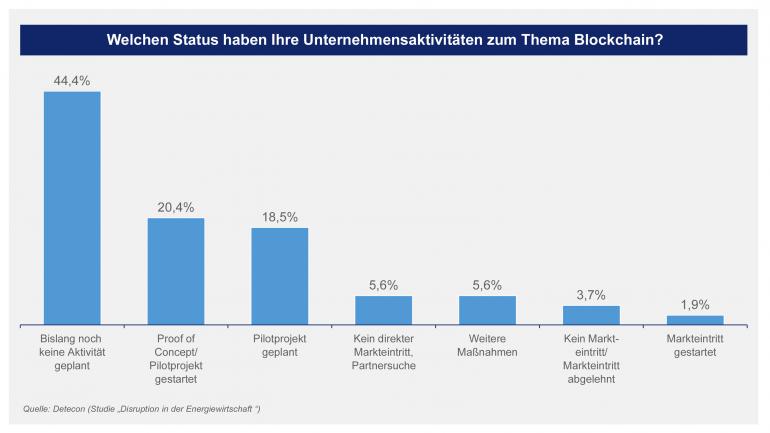Media Information
Blockchain Disruptively Changes Energy Industry
Detecon-Study
Trade and sales will decline in importance because of blockchain technology
New business models support e-mobility and neighborhood models
Cologne, 05 December 2018. Forty-six percent of energy providers are already involved with measures preparing for the use of blockchain technologies and just under 80% believe that blockchain will change the energy industry. However, in the opinion of half of the respondents, it will be at least two more years before blockchain reaches market maturity on the energy market. These are the results of a recent Detecon study on the possible significance of blockchain as a disruptive technology in the energy industry.
The energy industry is right in the midst of a market environment that is undergoing a massive transformation. The transition to power generation from renewable sources in combination with decentralized energy production and digitalization confronts the energy providers with enormous challenges. The small-cell structure of the generation mix is spreading at an accelerating rate, which has an impact on power grid, measurement technologies, and sales. The energy providers must aggregate the local energy generators and organize and maintain the acquired data securely. Moreover, they must manage the tiniest energy flows and control signals at low transaction costs while simultaneously developing new sales models.
Blockchain turns business relationships upside down
Viewed in this setting, does blockchain technology offer an opportunity to transform the energy market disruptively? “Blockchain has the potential to turn the relationships of the market players upside down. Over the long run, intermediaries will disappear from the market. Thanks to blockchain, producers and consumers will interact directly with one another, and this will completely change energy trade and sales,” said Rüdiger Schulze, Partner at Detecon. According to the study, trade and sales will decline in importance.

Essentially, the relevance of the blockchain technology in the energy industry will be driven by intelligent power meters – smart meters – and the internet of things. More than 80% of all respondents agreed with this statement. Moreover, it will support new business models – above all in the areas of e-mobility and neighborhood models, the so-called microgrids. For instance, prosumers will trade their self-generated solar power with one another. The transactions will be conducted and documented automatically via blockchain because it makes direct and secure transactions among multiple parties possible. One possible application comes from large peer-to-peer trading platforms that energy providers will use for wholesale power trade without intermediaries. These platforms will improve efficiency and increase the speed of the transactions.
Blockchain automates transactions at e-charging stations
Just under 70% of the respondents are convinced that blockchain can also support the establishment of a charging infrastructure for e-mobility. Transactions between the charging station and electricity customer can be automated, reducing costs. One use case that is already being applied involves “smart contracts” that are revolutionizing the billing and payment process for charging and using the charging infrastructure, making the provider’s processes between charging and payment significantly more efficient and less expensive.
Blockchain also contributes to stabilization of power grid operation and with it to supply security and quality. One Dutch grid operator is already using blockchain for its bottleneck management. Operating on the basis of interconnected home storage units and charging stations for electric vehicles, the grid operator uses blockchain to access decentralized capacities flexibly as required by the grid situation, equivalent to the use of a virtual power plant.
“We recommend that the energy providers initially carry out pilot projects in a protected space,” said energy expert Rüdiger Schulze, “because the implementation of blockchain presents major technical and organizational challenges to companies. A pilot project will help to understand the technology and ensure acceptance within the organization.” A sensible idea is to create a multifunctional team from IT, sales, controlling, marketing, and technology and to involve customers in the process.
Study design
During the study, 65 representatives of energy providers from Germany, Austria, and Switzerland were surveyed. More than half of the respondents are management board members or work one level below the management board. The survey was conducted in writing in the period from the middle of May to the middle of July 2018.
Your Contact


